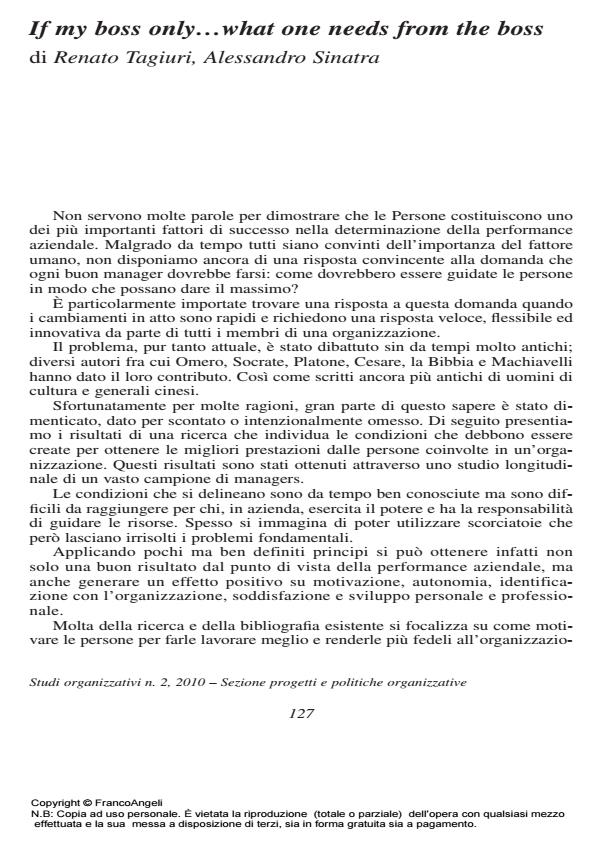If my boss only... what one needs from the boss
Titolo Rivista STUDI ORGANIZZATIVI
Autori/Curatori Renato Tagiuri
Anno di pubblicazione 2011 Fascicolo 2010/2
Lingua Italiano Numero pagine 13 P. 127-139 Dimensione file 658 KB
DOI 10.3280/SO2010-002006
Il DOI è il codice a barre della proprietà intellettuale: per saperne di più
clicca qui
Qui sotto puoi vedere in anteprima la prima pagina di questo articolo.
Se questo articolo ti interessa, lo puoi acquistare (e scaricare in formato pdf) seguendo le facili indicazioni per acquistare il download credit. Acquista Download Credits per scaricare questo Articolo in formato PDF

FrancoAngeli è membro della Publishers International Linking Association, Inc (PILA), associazione indipendente e non profit per facilitare (attraverso i servizi tecnologici implementati da CrossRef.org) l’accesso degli studiosi ai contenuti digitali nelle pubblicazioni professionali e scientifiche.
How should people be guided so that they can perform at their best? It seems to us that the problem is not how to motivate people to work better, but to manage to lead the whole person so that he/she does better work. This involves more than "motivation" such as an understanding of the job, of its purpose, of the situation, skills, trust. The effectiveness of personnel depends largely on how it is "managed" or on how it is "guided". These two modes refer to a deep difference in the relationship between superior and subordinate. To manage or "to lead by hand" places the manager in a superior position to the managed. This means obedience rather than initiative, following the rules rather than responding creatively to problems. To guide means to show the way to an objective and let the individual proceed in his/her own way. No single formula or style can guarantee effective management of people, yet according to our subjects there is a set of behaviors that lead to the best performance. The behaviours described, while basic, can be expressed in a variety of styles appropriate to specific situations. The adoption of the essential behaviours cannot occur quickly, as it requires not only a particular mindset by managers but also the willingness, capacity, tolerance. Utilization by the collaborators also may require time to learn to benefit of such behaviors on the part of their superiors. Finally this paper is not on "good" leadership of men and women; its only aim to describe what subordinates regard as essential behavior by their boss to enable them to do their best work. We make no attempt to relate our results to performance, although there may be one.
Renato Tagiuri, If my boss only... what one needs from the boss in "STUDI ORGANIZZATIVI " 2/2010, pp 127-139, DOI: 10.3280/SO2010-002006